In this series of articles and interviews centered on narrative, it was just a matter of time to end up talking about Heavy Rain. When I first bought the PS3, this was the game that I expected most and it certainly didn’t disappoint me. Just the fact that when the game was first shown they decided to create a different story so as not to spoil the actual plot is a proof that Quantic Dream knew what they were doing.
There are many things in Heavy Rain that are worth talking about and that are part of its narrative: the graphic user interface, its interactive structure, the rhythm of the action or the kind of decisions we are faced with. The most interesting thing is that, even though all these concepts are usually present in a lot games, here they are treated in a very different way. To talk about them, I contacted Guillaume de Fondaumière, Co-CEO of Quantic Dream.
Agonz: Whenever I think about Heavy Rain, the Word “emotions” comes to my mind. Even though we’ve seen some great characters and tragic stories in videogame’s history, very few of them actually inspire similar sensations to what a movie can produce. To achieve this, HR focuses on conversations and decisions, leaving the gameplay on the background and using it as a way to reinforce the identification with the characters, making us do what they do. How difficult was to introduce game mechanics in what could we defined as an interactive movie and what were the concerns during this process?
Guilllaume: I think all video games trigger an emotional response from their audiences; the question is: how do you trigger the subtle ones, those which are not “instinctive” or “primitive” (such as fear, excitement, frustration or aggressiveness) but rather “social” (such as love, empathy, joy, sadness, anger, shame, etc…)? There are many different ways to trigger subtle emotions, we have chosen, at the core, the one that is probably the most universal and efficient one, namely narrative. It is also the one that in our mind is the most suitable for our adult target audience.
Once our decision was made to base the experience on narrative, the challenge was to create 1) an engaging and meaningful story, with appealing characters to whom players could identify or relate to, 2) an experience that would be truly interactive (“the story evolves constantly through players actions, not cut scenes”), 3) a game adapted to a core gaming audience (“offer a wide palette of interactions, at least as rich as in other games”) as well as to more occasional gamers (“make it accessible, put the challenge in people’s minds rather than on the controller”).
All 3 aforementioned steps represent true challenges, and ultimately the alchemy of the three makes or breaks the experience.
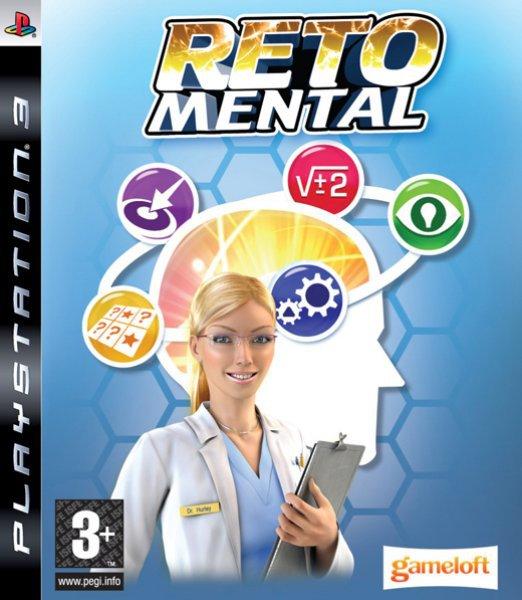
Very early on (in fact during the development of our past title Indigo Prophecy) we discovered that we couldn’t properly tell a meaningful story through the use of repetitive gameplay mechanics. We wanted to give players the possibility to be truly in control of the playable characters, for them to be able to interact (talk, touch, fight…) with other protagonists but also with everything else surrounding them in the environment, such as in real life, as naturally as possible. We also wanted to give players the possibility to perform all sorts of actions, and at the same time didn’t want to use cut scenes or inventories, which inevitably meant extracting the player from the game world and thereby from the experience in the middle of the action.
To realize our goal, we had to break with conventional gameplay paradigms (e.g. pressing one particular button always triggers the very same action) and come up with a new “grammar” for interactions, blending few repetitive patterns for basic interactions (that could be taught once and for all to the player at the beginning of the experience) with a great number of non-repetitive contextual ones that could potentially only appear once in the whole game. Once this concept had been defined, we had to associate each individual action to something the player would do using the controller. Here, the rule was to use the different controllers (Sixaxis or Move) in such a way that the action performed by the player would be matching as much as possible the action happening on screen. This meant we had to experiment, prototype and test a lot to come up with intuitive controls, so that after a few scenes, players would perform them without thinking.
Another critical layer to the fluidity of the gameplay during these (massively present) contextual interactions throughout the game was to invent the right visual language (user interface) required for the player to always instantly understand what she/he had to do at a given moment.
Although Heavy Rain is one of the games with most interactions, all these efforts hopefully led to an experience in which the story is in the foreground, and controls almost forgotten.
** In my opinion, even though I know some people will disagree (Mugen, I’m looking at you) the graphic user interface and the game mechanics are brilliant: the contextual actions are not only not disrupting the narrative, but actually reinforcing it. What we are doing with the controller is actually what we are watching in the screen; we are not triggering the action, we are performing it in first person. This is of great help both to the identification and humanization with the characters and to the credibility of the story: since we are not presented with the same kind of mechanics we are all used to, it is easier to forget that we are playing a game.
However, obviously not everything can be perfect and I found myself struggling with the cameras: sometimes they didn’t show what I wanted to see or they were confusing whether moving forth ward the stick would end in my character moving in one direction or another. **
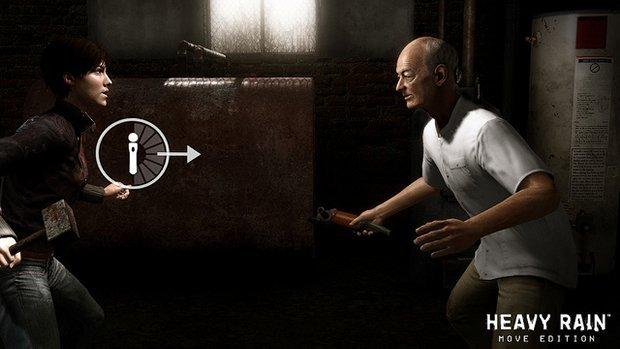
Agonz: One of the most interesting things in Heavy Rain is the lack of parameterization. Our choices are never visually evaluated as correct or even ethical, that work is left to the player’s mind. This along with the impossibility to save and load the game at will makes Heavy Rain look much closer to real life than to a videogame. How important do you think this is to the feel of the game?
Guillaume: Heavy Rain differs from other games as it puts emphasis on the Journey, and not on Achievements. Gamers are confronted with choices, sometimes heavy moral or ethical choices, but our job is not to judge them; instead, we prefer to offer them the possibility to see the logical consequences of their actions. Living these consequences and portraying them as realistically as possible leads players to feel good or bad, joyful or sad, etc… and we believe this is far more engaging and powerful than ranking them in a points system. This “life likeness” raises the emotional stake and thereby the involvement of the player in the experience. I think this truly IS what makes Heavy Rain so uniquely engaging.
** Heavy Rain is not supposed to be difficult skill wise, but it had to be thrilling and exciting. This is mainly achieved both with an appealing story and the decisions we have to make during it. There are two things that are truly unique about this decision making process: first, the options we can choose to perform are not always obvious in what they will result in. There are times when doing something apparently unimportant without thinking will lead us to a very nasty unexpected situation, making us feel guilty and kind of stupid. Some other times, it’s not the surprise but the morality where the focus lies: since the identification with the characters is so strong, we may be taking a decision we don’t want to take, but that we feel we should.
Second, these choosing moments are not waiting in a fixed point for us to interact with them; they are a true part of the evolution in the story. Many times we won’t even realized we are before a choice, we will feel that we are acting the way we want to during a conversation. The times when we interact mimetize with the plot, achieving a non dramatic look really satisfying. Besides, the characters with whom we can talk are not mere drag dolls that will follow blindly our every choice, but they have their own personality that can or not enter in conflict with how we decided to behave. The need to keep the conversation going without time to choose our line of dialogue along with the impossibility to save and load the game to choose different options if we dislike the way things ended gives the game a thrilling rhythm that successfully awakens several of the subtle emotions described by Guillaume.

Talking about the rhythm of the story itself, it’s here where we can realize Quantic Dream has studied the lessons the cinema can teach, removing all the null moments (moving between places or inside localizations without narrative importance). Only during the introduction this will happen, when it’s necessary as a tutorial. If we make a comparison with L.A.Noire, the last game that tried to achieve something similar as what Heavy Rain looked for, most complaints from users readable on blogs refer to a sandbox structure that is uncalled for, boring and to the mechanic of right guess/mistake during the questionings. During these, the story opens or closes itself if we have guessed right or wrong; besides, it tells us when we have done a mistaken guess making us feel that if we want to know the whole story we will have to reload the game, taking us out from the game experience abruptly and making us feel frustrated. **
Agonz: The approach to morality in Heavy Rain is quite subtle. Even though, as I said, the game doesn’t reward us for acting on a certain way, taking the most self-sacrificing decisions will lead us to a happier ending. This is quite effective at making the player feel guilty and responsible for whatever happens, but it can also make hard to be able to step away from the ethical path and can end up with the player feeling guided. How was this issue solved in Heavy Rain?
Guillaume: The theme of the game is indeed “how far are you prepared to go to save someone you love” – which implies various degrees of sacrifice, but I would disagree that the most self-sacrificing decisions necessarily lead to happier endings. Heavy Rain features 23 distinct epilogues, and not one but a multitude of decisions lead to either of them….with rather different fates for the four main protagonists the player controls.
What was important to us is to question the player as an individual and make sure there is a plausible (and, from a story perspective interesting) consequence to his actions. We wanted the player to be 100% engaged on an emotional level and never feel frustrated. Also, most moral or ethical choices the player is confronted with are not black or white, and many times there is not even time to think: instinct or pressure will lead to certain (re)actions leading to dramatic changes in the storyline. Like in real life…
** It’s hard to talk about this point without entering directly in the plot. Even though it’s true that there are a lot of heavy complex choices with unexpected results in Heavy Rain, the, let’s say, main part of the plot is based on a “do this to get that” structure, in which if you do this, you get that. This can create the sensation I said before. Even though it doesn’t have to be something bad, I would have liked that the surprise factor that is present in other parts of the story would also be included here, when we take a choice for a reason only to discover we achieved the exact opposite of what we were looking for.**
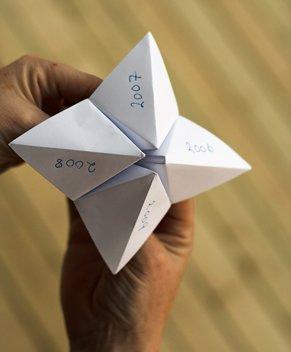
Agonz: The interactive narrative structure of the game consists of different chapters that continue each other in a sequential way while having in consideration what we’ve done or said. Is it possible to build suspense in the way a thriller needs while allowing the player to have a great control over the plot or to choose the order in which it develops? Are you exploring with different kinds of structures for future games?
Guillaume: There are many structural ways to tell a story: what is true in literature or movies may very well apply to games, and as interactive narrative is David Cage’s playground since 15 years, I would be surprised if he wouldn’t explore different narrative structures in the future. But there needs to be justification for that, it shouldn’t be only an intellectual exercise.
** Ok, I admit that, personally, I am fascinated by every innovation even though sometimes these are not successful or end up achieving what they were trying to get such as, per example, the transmedia incursion of The Matrix, trying to tell one story through three ways: the movies, the animation and a videogame. It didn’t work, it wasn’t understood and it reached no-one, I wouldn’t even dare to say what they were trying to achieve, but I find it fascinating.**
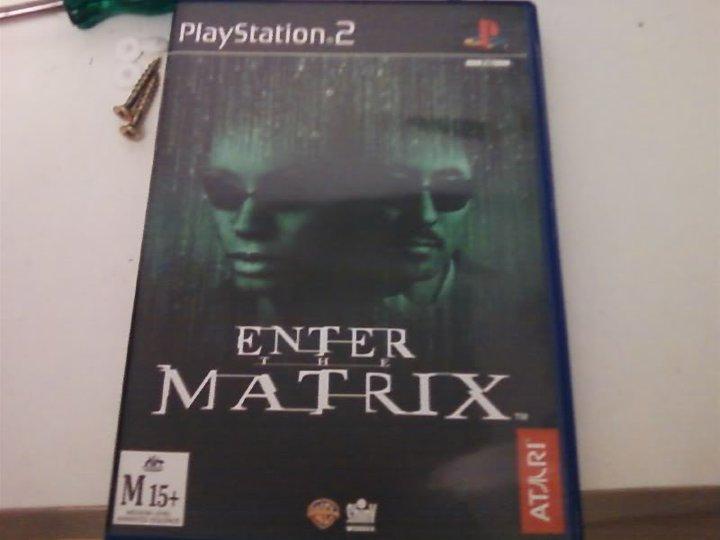
Agonz: It is usually quite hard for reviewers to write about games so different that cannot be suited upon a particular genre and we’ve seen examples of innovative games that had bad some critics partly due to this fact. However, Heavy Rain’s reception has been quite successful and it has won several awards (I suppose Bafta’s night must have been really gratifying). Was there a fear about the game not being understood? Is marketing easier or more difficult for these kinds of games?
Guillaume: Heavy Rain being indeed hardly comparable to other games, it has been a huge relief when we saw how consistently positive the game reviewed across the globe. Our biggest fear was that it wouldn’t be recognized as “a game” in the conventional sense of the word, and thereby rejected. We knew we had crafted the game the way we wanted it to be, but feared that the reception would be really polarized between those who would understand what we had in mind, and those who wouldn’t. We are happy for Quantic Dream and Sony but also for the development community at large as its success signals to all that non-traditional games and original IPs can be equally critically and commercially successful than sequels and me-toos.
As for marketing, when your work cannot be truly benchmarked, conceiving a successful campaign indeed requires some thought and risk taking. You can’t work out your plans mechanically according to standard plans, you have to come up with new concepts and be creative. However, in a competitive market such as ours, I believe that distinctiveness must be regarded as an asset, not a liability: I would therefore say it certainly appears at first sight more difficult to market such as game, but at the same time it is far more interesting and the rewards are huge if you succeed.
** Probably, the most interesting bit is that vision of Heavy Rain being a back up for the development industry. I understand that to a directive it is hard to approve a new IP; it’s a risk: it will need more marketing and the reception is uncertain, the game will have to be really good to sell itself, since it can’t count on its name to sell for it. However, it’s a verifiable fact that the franchises inherited from the last gen didn’t perform as well as they expected (Resident Evil 5, Final Fantasy XIII…) while they ones that emerged new remain fresh longer (Bioshock, Uncharted, Mass Effect…).
It’s hard to keep a balance, since we all clearly love sequels (give a Capcom fighting game without Ryu and I won’t be as interested in it as I may have been) but the new IPs always bring something new.**
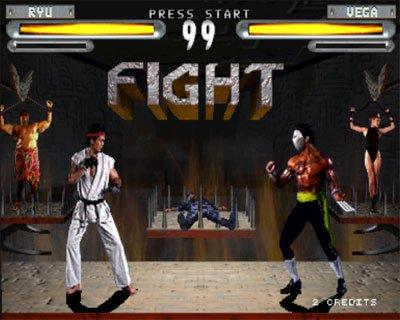
Agonz: Finally, since this article/interview will be published after the E3, is there anything that you want to add to what may have been said during the show? For I really hope Quantic Dream surprises us with something new : )
Guillaume: It is too early to reveal anything about our future projects. All I can say is that they are unique and we are working hard on them.
You may be wondering now: if this question doesn’t really add anything up to the article, why did you keep it in? Easy, thanks to it I am planning to get a job as a fortune-teller on a night TV show. It’s demonstrated I have absolutely no idea what I’m talking about, isn’t that the condition to work there?
Finally, did you realize the lack of any mention to a game that was supposed to be the contestant against Heavy Rain? Can you guess why?
Remember you can follow me on my Twitter: @agonzalezmosq


